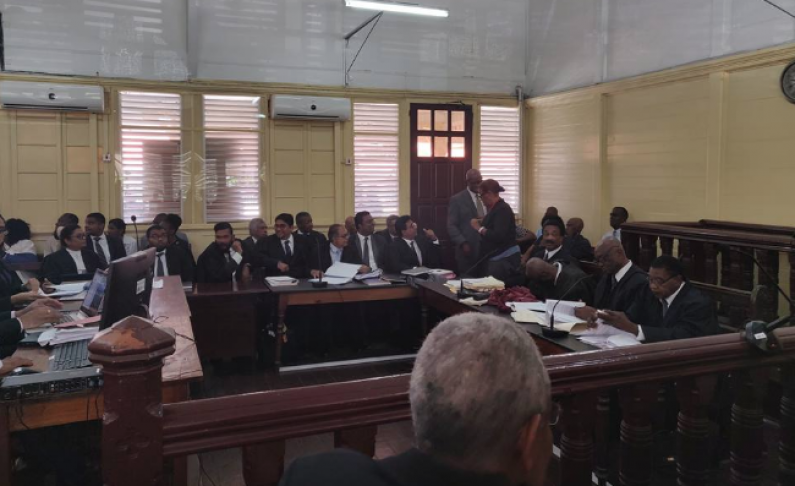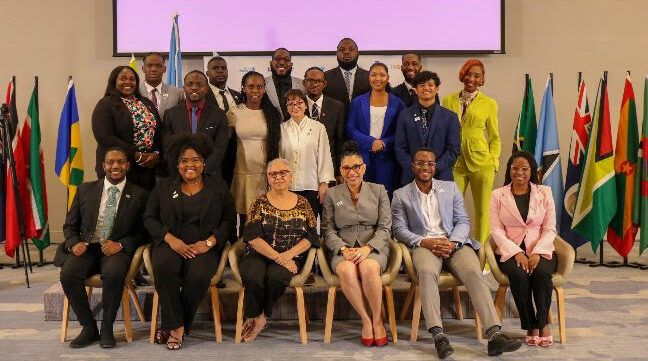The Guyana government is arguing that was a miscalculation of the majority of all elected members of Parliament as required by the Constitution for it to have been defeated on a vote of no confidence.
This is among the submissions the Chamber of the Attorney General filed in the Supreme Court on Friday in keeping with the deadline set by acting Chief Justice, Roxanne George- Wiltshire, as the court prepares to hear arguments regarding the validity of the December 21, 2018 successful opposition People’s Progressive Party (PPP) motion of no confidence that resulted in the downfall of the David Granger led coalition government.
The PPP had received the backing of then government back bencher, Charrandass Persaud, in ensuring passage of the measure in the 65-member National Assembly where the coalition government had previously enjoyed a slender one seat majority.
Earlier this week, Justice George-Wiltshire said she intended to give a ruling by the end of this month regarding the three matters challenging the validity of last month’s motion of no confidence.
She told lawyers representing the various parties during the case management hearing that they should submit their legal arguments within the specific deadlines
On Tuesday, the Chief Justice heard the case management for the cases “Compton Reid vs The Attorney General, Persaud and The Speaker of the National Assembly; Christopher Ram vs The Attorney General and Speaker of the National Assembly and the Attorney General vs The Speaker of the National Assembly and the Opposition Leader.
She has given the lawyers in all three matters to file their pleadings and make their submissions by January 18 while rebuttals have been listed to take place by January 21.
Oral arguments have been set for January 24 in all of the matters. However, the attorney representing Ram will make his oral submissions on January 23.
According to a government statement, the Chamber of the Attorney General is seeking the High Court’s intervention on whether 33 votes in favour of the motion of no-confidence amounted to a majority of all elected members in accordance with Article 106 (6) of the Constitution.
“Regarding the first issue, the AG (Attorney General) said there was a miscalculation of the majority of all elected members as required under Article 106 (6) of the Constitution for the Government to be defeated on a vote of no confidence,” the statement noted..
It said the Granger administration is also asking the court to determine whether Resolution 101 is constitutional and effective and passed in accordance with Article 106 (6) of the Constitution.
“On the second issue of whether Resolution 101 is constitutional and effective and passed in accordance Article 106 (6) of the Constitution, it was submitted that the failure to obtain 34 or more votes breached article 106 (6) of the Constitution and was unlawful and the certification by the speaker by issuing Resolution 101 could not be conclusive.”
The High Court is also being asked to determine whether section 5 of the Constitution (Amendment) Act, 2000 (No 17/2000) is constitutional and not inconsistent with article 70 of the Constitution ad whether the Speaker’s ruling on the vote can be quashed by the Courts.
“The third issue which questioned whether section 5 of the Constitution (Amendment) Act, 2000 (No 17/2000) is constitutional and not inconsistent with article 70 of the Constitution. The Chamber said the framers of the Constitution in article 70 (3), having guaranteed an elected government, a five years term of office which five years term is protected by entrenchment by the requirement of 2/3 of all the elected members of the National Assembly voting to reduce that 5 years, could not at the same time have intended that a future Parliament were to be permitted to abridge or curtail the enjoyment of that five years, by introducing into the Constitution via a provision that is not entrenched at all a process called a ‘vote of confidence.”




